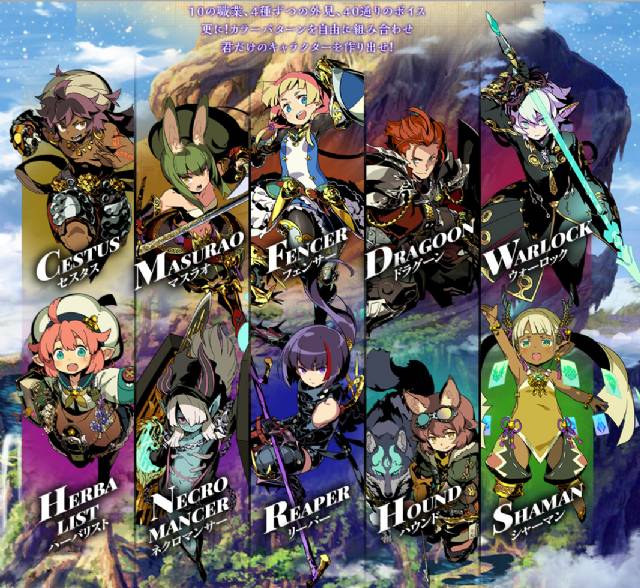Yggdrasil
Unlike the two Etrian Odyssey Untold released in recent years on the consoles of the 3DS family, where the development team had added a story mode that lowered (slightly) the difficulty level and added a more elaborate plot to the usual dungeon expl
oration, Etrian Odyssey V is a tough and pure franchise representative who remembers much more the first trilogy, out of DS, than the fourth chapter.
It is no coincidence, however, that if the title of this fifth chapter, after Kaneda’s parenthesis for the fourth episode, returned to Shigeo Komori, already responsible for the second and third episode, we believe that two of the best of the whole franchise so far.
In the process of returning to the roots, to lose, especially with respect to the aforementioned outputs, is the narrative scaffolding, which h
as the thickness of a film studio carton: a group of adventurers who the player will be called to create from zero to beginning match, will be attracted by the everlasting fame of Yggdrasil’s maze, a multilayer maze infested with traps, immeasurable treasures, and, above all, monsters of the fiercest.
According to the legend, not
only is the immense tree responsible for the balance and peace that reigns in the world of Arcania, but those who are sufficiently brave (or crazy?) To reach the top will see their desire, which is the eternal life or rich wealth. The folklore of the different race
s (humans, elves, a kind of hobbit and semi-humans with improbable rabbit ears) that populate Arcania are discordant about the nature of Yggdrasil itself and the type of desire that you can see satisfied, but the point on which they all agree is that t
he enterprise is improvised and that, therefore, rewards should be heavenly. Music for the ears of adventurers from all over the kingdom, flocking to the village at Yggdrasil’s feet to invent and venture into the labyrinth,
What destiny awaits our party?
Dungeons and Dragons to the Japanese
From the character creation stage and through the casual events that you can encounter during the exploration stages, Etrian Odyssey V reminded us, even more of his predecessors, the long evenings spent playing Dungeons & Dragons in adolescence, when he hung on the master dungeon’s whims and the character’s card.
Yes, because, more than in the past, and definitely more than the last two episodes titled Untold, the creation of the five characters that will co
mpose the party is of paramount importance: averse choices in this phase end with the repercussions on the gaming experience after a couple of hours, halfway through the exploration of the first layer of Yggdrasil.
Initially it is possible to jum
p between four different races and ten classes in total, with each of the classes unable to access some of them.
Each class has distinctive features, strengths and weaknesses, which are excellently matched to the initially selectable classes, but to the player, at the end of the first main mission, an object will be given to allow, at the price of five penalty levels, to all classes with all ra
ces: already here, a few tens of minutes from the first start, the player is called to a painful choice, which should be well weighted.
If, in fact, five lost levels are not many, especially during the early stages of gaming, the ability to have a character that incorporates the best features of the rac
e of belonging, and at the same time the benefits of an initially unclassified class is by no means to be neglected.
The advice, especially for newcomers, is to opt for a robust party that is able to cash in well and covered with a strong first line, otherwise the title curve, already steep in itself, can become insurmountable.
As a veteran of the series, we stumbled across se
veral games over the first real boss, whose level was unexpectedly higher than that of the monsters that surrounded him.
Considering that healing objects are rare and expensive, and that dead characters at the end of combat do not gain experience from it, it is crucial to have curators (even more than one) and characters able to remove timely statuses.
The other two novelties, as anticipated, are represented by random events occurring randomly within labyrinths and Union Skill.
The former offer the thrill of choice and risk, and they reminded us of the times when the above dungeon master with a malignant smile told us a situation and asked us how we wanted to behave before it: treating a wounded animal or let him die? Collect an unattended object or go over fearing a trap?
In the most unlucky cases, you can find yourself in a fight against enemies above your chances, while in others you can earn high-value items, otherwise inaccessible: those who do not risk not rogue, and the game puts everything in the hands of player.
Union Skill, in the face of enemies always ready to make skin to our adventurers, represent a valuable arrow in the player’s arc: each team member fills a counter fighting, and when that is full, he can use the collaboration of a his companion (assuming they also have the bar sufficiently full) to use special skills, which have the added value of not consuming the turn.
There are some who take care of the whole party, others that remove the altered states, others that guarantee an extra attack of particular power: to wager them is often the key to victory.

